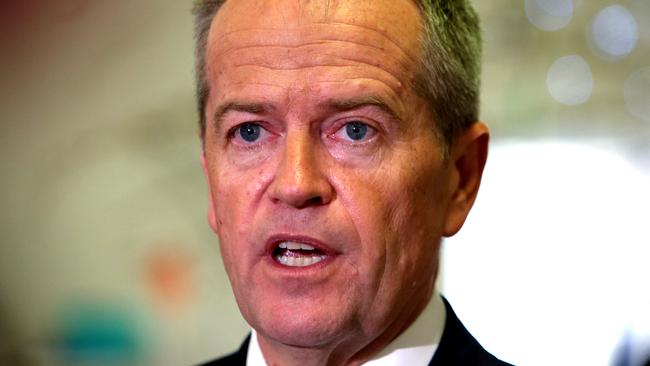Aged care tells ALP: we need pay rise
Aged-care groups demand Bill Shorten extend his $10bn childcare pay rise pitch to nursing home staff.

Australia’s three largest aged-care groups have demanded Bill Shorten extend his $10 billion pitch to fund childcare pay rises to nursing home staff — a move that would cost up to another $30bn over the decade.
The Opposition Leader yesterday signalled he was open to broadening his wage offer across other sectors, declaring that his taxpayer-funded 20 per cent pay rise for childcare workers was the starting point for a future Labor government.
“We have picked childcare workers to go first,” Mr Shorten said. “I think this is a strategically important industry. What we bring to the table is goodwill. And more than goodwill, we are willing to find money.”
Scott Morrison criticised Labor’s plan as unfair for other low-paid workers and challenged Mr Shorten to explain why employees in construction, retail or hairdressing jobs did not also deserve a taxpayer-funded pay rise. “I mean, is this how Bill Shorten is going to run the economy? Is he going to set everybody’s wages?” the Prime Minister asked. “Bill Shorten is going to be a very hungry caterpillar chomping into your wallet; chomping into your wallet to pay for his spend-a-thon.”
A major pay deficit in aged care — one of the lowest-paid industries, with a majority of women workers — was documented in a government-commissioned report showing that workers and nurses were paid on average 15 and 10 per cent less than their peers in hospitals and in primary health services.
Council on the Ageing chief executive Ian Yates — a member of the reporting group that handed down its findings in September — said Labor’s proposal to directly fund childcare worker pay rises set a precedent.
“Absolutely, we have been putting pressure on both sides to commit to pay rises for the sector and this has created the precedent now,” Mr Yates said. “If you did all of the initiatives on workforce (from the government report) and fully implemented them, it would cost about $3bn extra each year.
“That figure never made it into the report, of course.”
Economists and business leaders have warned Mr Shorten his plan will trigger more claims for pay rises to be financed through higher taxes. Business Council of Australia chief executive Jennifer Westacott warned that the proposal could threaten the industrial relations framework.
“It is vital that proposed changes do not undermine the independent wage-setting system which has served Australia well and that wage subsidies are not allowed to undermine the workplace relations system,” Ms Westacott said.
“Political leaders who want to boost wages should work towards making our enterprise bargaining system stronger and getting the settings right to boost investment and productivity across the whole economy.”
Although Labor will feel most pressure from the aged-care sector, it would cost almost $20bn to give the same 20 per cent increase to workers in manufacturing and retail, and almost $10bn to boost pay for hospitality workers, hairdressers and beauticians, and commercial cleaners.
These calculations are based on average award wages and the number of workers in those jobs.
Australian Chamber of Commerce and Industry chief executive James Pearson noted that a union equal-pay claim for childcare workers was rejected by the industrial umpire last year because of a “lack of evidence”. He warned that the shake-up could also disadvantage small business owners.
Concerns were sounded yesterday that the Labor childcare wage plan was also aimed at increasing unionisation in the sector, amid speculation the top-up would be delivered through the enterprise bargaining system.
The previous Labor government created the $300 million Early Years Quality Fund in 2013 to dole out selected pay rises over two years to childcare workers. Service providers could only access the fund if they had an enterprise agreement at a time when only one-quarter of all operators did. The fund was scrapped by the Coalition when it won government.
Luis Izzo, an employment and industrial relations lawyer with Australian Business Lawyers & Advisors, said it was most likely that Labor would deliver its proposed 20 per cent pay increase to childcare workers through the enterprise bargaining system.
“The fact that employers have to negotiate an enterprise agreement means there is a greater likelihood of union involvement,” Mr Izzo said. “It effectively provides an opening and opportunity for unions to come in and hold discussions with employees and bargain on their behalf.”
When Labor was last in government it also legislated a five-year, $1.2 billion aged-care sector “workforce supplement” that would only have been paid to nursing home operators who engaged their employees “under enterprise agreements providing minimum wage levels”.
Tony Abbott dumped the law within months of winning government, saying the money was a union-stacking exercise. The sector was also divided because not all staff would have been eligible for increased pay, especially in rural and regional areas.



To join the conversation, please log in. Don't have an account? Register
Join the conversation, you are commenting as Logout